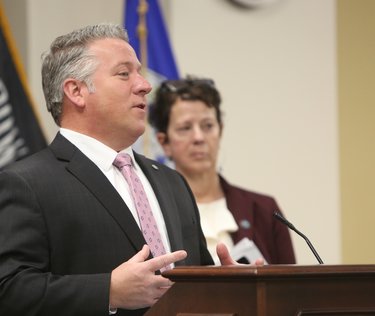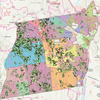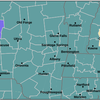County grants tax breaks for new ADUs
Enterprise file photo — Michael Koff
Albany County Executive Daniel McCoy, pictured at a March press conference about a plan to give tax breaks for accessory dwelling units, said this week, “We are empowering residents to be part of the solution to our housing challenges, and promoting multi-generational living.” Joanne Cunningham, who chairs the county legislature, at right, sponsored the bill.
ALBANY COUNTY — Starting with the new year, Albany County residents who build accessory dwelling units, known as ADUs, in their yards will get a tax break.
The county legislature approved the bill this week in the midst of a local and national housing shortage.
“By removing one of the financial barriers for the construction of accessory dwelling units, we are empowering residents to be part of the solution to our housing challenges, and promoting multi-generational living,” said Albany County Executive Daniel McCoy in a statement, announcing the passage of the bill. “We’re dedicated to practical solutions that strengthen our neighborhoods and increase housing accessibility.”
In April 2024, the state legislature adopted a law to allow local governments to grant a partial exemption from taxes for the increased value of a property with a one- or two-family home where ADUs are built.
The county law defines an ADU as “any attached or a detached residential dwelling unit that provides complete independent living facilities for one or more persons which is located on a lot with provisions for living, sleeping, eating, cooking, and sanitation on the same lot as the single-family or multi-family dwelling.”
The increase in market value must be between $3,000 and $200,000. The increase will be fully exempt for five years and then partially exempt over the following five years in decreasing percentages: 75 percent, 50 percent, 25 percent, 15 percent, and 5 percent.
The exemption does not apply to ADUs used for short-term rentals.
The county’s goal is to lower costs for accessory dwelling units, making more housing available.
Rural Westerlo, one of the Helderberg Hilltowns, in May did away with the requirement for a special-use permit to build accessory-dwelling units of a certain size.
Now, any ADU up to 1,200 square feet of living space is permitted by right in Westerlo. A unit larger than that will still require site-plan approval and a special-use permit.
Similar to the county initiative, Westerlo’s initiative is to make up for the lack of easy senior living in town.
In suburban Guilderland, as the town is in the midst of updating its comprehensive plan, one of the recurring topics residents have stressed at public hearings is the need for affordable housing, particularly for seniors and young people.
At a hearing in February, one resident said Guilderland has a “housing caste system.”
At a later hearing, in March, Guilderland Supervisor Peter Barber said, “Single family homes are really beyond the reach of the average citizen in our town.”
Last July, Guilderland was the first municipality in Albany County to be certified as a Pro-Housing Community.
Kenneth Kovalchik, Guilderland’s town planner who spearheaded the drive for the designation, told The Enterprise at the time, “Establishing ourselves as a pro-housing community is one way in fighting back against the exclusionary and discriminatory ideologies that exist in our community, particularly when it comes to housing.”
In adopting the resolution to become a pro-housing community, the town agreed to streamline permitting for and adopt policies encouraging multifamily housing, affordable housing, accessible housing, accessory dwelling units, and supportive housing.
It also agreed to adopt policies that further fair housing, to incorporate regional housing needs into planning decisions, and to increase development capacity for residential uses.
County initiative
The county announced the proposal for its new law at a press conference in March as part of a larger initiative to increase affordable housing.
The bill was introduced in May by Joanne Cunningham, who chairs the legislature, and by Wanda Willingham, deputy chairwoman.
Cunningham, who lives in suburban Bethlehem, said in March that she and her sister had worked to build an addition to her sister’s home for their elderly father whose health was failing. Unfortunately, their father died before he could use it.
“It’s a great option for older people who want to be with their families,” said Cunningham, “and a great option for them to have kind of a segregated space.”
She added, “You’re also freeing up housing for other folks that need it in Albany County, which is also smart. We have a housing shortage here.”
Willingham, who has represented Arbor Hill for a quarter of a century, cited a slew of studies from around the nation that showed myriad benefits from stable housing.
One study, she said, showed “stable housing relieves toxic stress, which can corrode a person’s ability to process information, even lead to medical depression.” Another, she said, showed it reduced recidivism rates. She said of prisoners re-entering society, “The most difficult thing for them is to find housing.”
The county’s new initiatives, Willingham said, will address “inequities in housing opportunities that face people of color in Albany County.”
Federal maps in the 1930s, Willingham said, “redlined housing markets and said they were too risky for investment … Generations of people were disconnected, disenfranchised, and deprived of family wealth by buying homes.”
The new ADU legislation, Willingham said, would “generate more available housing inventory by rewarding property owners for investing in themselves and building accessory dwelling units for friends, family, or even new tenants.”



